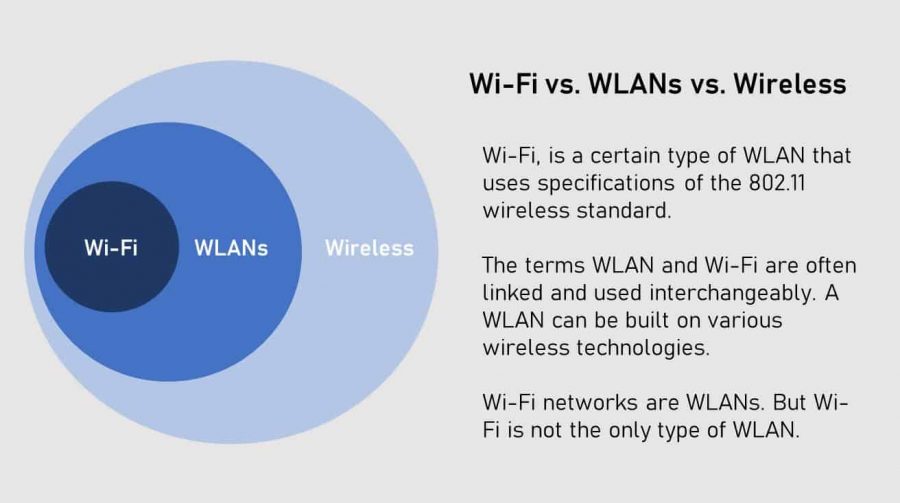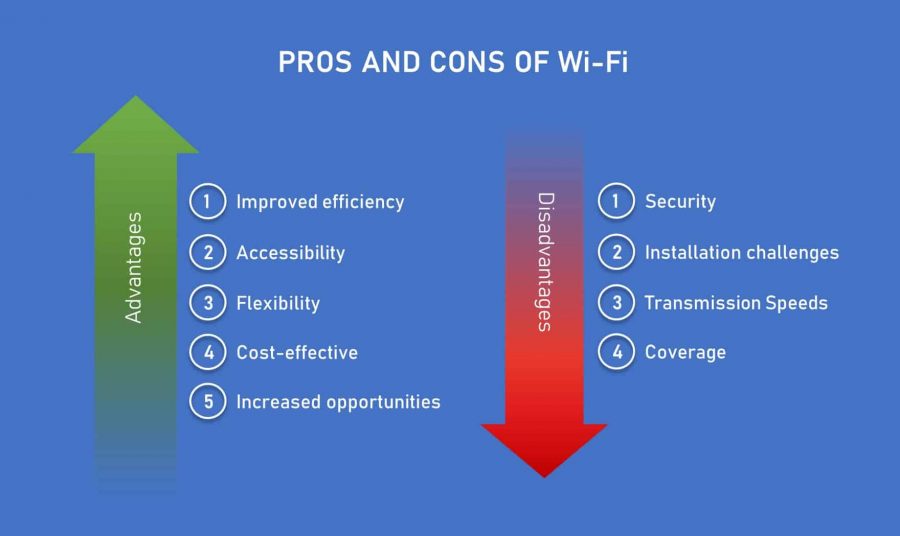Advantages and disadvantages of wireless networks

While wireless networks offer plenty of business benefits, there are some disadvantages, too. Wireless technology is a cost-effective and efficient solution when you don’t neglect security, since using wireless networks, always poses a security risk. Presented below is an overview of wireless technology, the advantages and disadvantages of wireless networks, and how wireless networks can help your business.
On this page:
An overview of wireless networking
Wireless connections are commonly known as Wi-Fi. It is an alternative to traditional fiber optic and cable networks. It is becoming the most productive tool for the mobile workforce. A wireless network utilizes radio waves instead of cables for connecting computers or laptop devices with the internet.
Also read: Understanding Wireless Networks – A simple guide for business
A wireless network offers devices the opportunity to stay connected to a particular network whilst being able to move freely without any wires.
The wireless signal is amplified by wireless access points (WAP), allowing the devices to be at a distance from the access point. Such an arrangement allows the device to remain mobile while still having to rely on cables or wiring to access the network.
Wireless Local Area Networks (WLANs)
It is vital to be familiar with wireless local area networks and what benefits they can provide to your business. A local area network without wires and cables is called Wireless Local Area Network (WLAN).
What Is WLAN?
WLAN networks allow computers to connect through wireless radio connections. It will enable them to share data and access external networks. You can connect multiple WLAN-enabled devices that are within the WLAN range.

What are Wi-Fi Hotspots?
WLAN hotspots are the services that offer customer access to broadband connections. Many Wi-Fi hotspots can be set up and used in a variety of locations.
Wi-Fi hotspots are also commonly available in public areas. This concept is becoming common in public places like hotels, cafes, restaurants, airports, and train stations. The purpose of these services is to allow employees to communicate with the company while traveling. These are convenient for people who need to connect to a network quickly or need to make updates while on the go.
The size of the hotspot is usually adjustable, depending on how many users can connect to it and the various computers and printers. For security reasons, you need to use an encrypted wireless network. A VPN is recommended when using public Wi-Fi hotspots.
Wi-Fi technology is straightforward to set up and does not necessarily require specialist knowledge to install and configure a basic wireless network.
Benefits of Wireless Networks
Wireless networks, such as a WLAN, can do almost everything that a wired LAN does, but it doesn’t require massive cable to connect users with the network. A WLAN set up can:
- Allow workers to stay online even when they switch their tablet, laptop, mobile devices, and PC to another wireless-enabled space
- Allows workers to share hardware and network
- Provide greater flexibility in an office
WLAN allows expanding network access where wiring won’t be a practical and cost-effective solution. For example, across all retail outlets, public spaces, health and job centers, and office adjacent to the storeroom.
The benefits of WLANs for businesses are:
- Sales staff can work even away from the office
- Companies can rely on flexible working styles such as hot-desking or home working
- Perfect for places where wiring isn’t cost-effective and impractical, such as listed buildings.
Wireless networking technology – benefits and drawbacks
There are many advantages and disadvantages to wireless networks, with one of the primary benefits being the ease in which it enables people to share information. The best part about Wi-Fi is the ability to use the internet connection to connect to various services.
Some of these services include television, high-speed Internet access, Bluetooth, VoIP, and many others. Such availability allows users to quickly and easily connect to the various wireless networks to stay connected to multiple online applications such as Facebook, Twitter and others.
There several advantages and disadvantages to a wireless network. Presented below are the key pros and cons of wireless networks.

Advantages of wireless networking
Now, you don’t need massive and expensive wires anymore. Moreover, it allows your staff to access documents, share files, and other resources within the network coverage. It is easy to set up wireless networks. In wireless networking, you don’t need any wires and cables, so it is a cost-effective solution.
The potential benefits of wireless networks are:
 |
Improved Efficiency – It provides a better and improved data communication that leads to faster information transfer between partners and customers and within the business. For example, it allows salespeople to check prices and stock levels remotely when they’re on sales calls. |
 |
Accessibility – Wireless technology doesn’t require any cables or wires, so users can communicate even when they’re on the move. You can easily access to office networks without the adapters and extra cables. |
 |
Flexibility – In-house employees can use wireless networks without sitting at the dedicated computers. Moreover, it allows users to do productive work even when they’re away from the office. These networks allow workers to work from home and have direct access to customer data. |
 |
Cost-effective – Wireless networks are cost-effective solutions because they are easy and cheaper to install. It is perfect for those buildings where landlords don’t allow the installation of cables. |
 |
Increased opportunities – By using wireless networks, you can introduce new products and services in the market. For example, many train stations, cafes, airport lounges, and hotels have installed Wi-Fi services to connect their devices while they’re traveling. |
Disadvantages of wireless networking
Presented below are some disadvantages of wireless networks or Wi-Fi.
 |
Security – Wi-Fi networks are more prone to be attacked by unauthorized users. So, you have to pay attention to security when you decide to use wireless networks. Avoid using public places connections; otherwise, you may lose your sensitive data.Related: Securing your Wireless Network |
 |
Installation Issues – If other users or businesses are using wireless technology within the same building, you may experience interference. It can result in poor communication or sometimes may result in complete loss of communication. |
 |
Speeds – In most cases, transmissions speeds of wireless networks are less efficient than wired networks. The speed on most wireless networks (typically 1-54 Mbps) is far slower than even the slowest common wired networks (100Mbps up to several Gbps). |
 |
Coverage – In some buildings, obtaining consistent Wi-Fi coverage may be challenging. For example, depending on the construction of the building, “black spots” may be present. You may experience weak or no signals in such black spots. |

